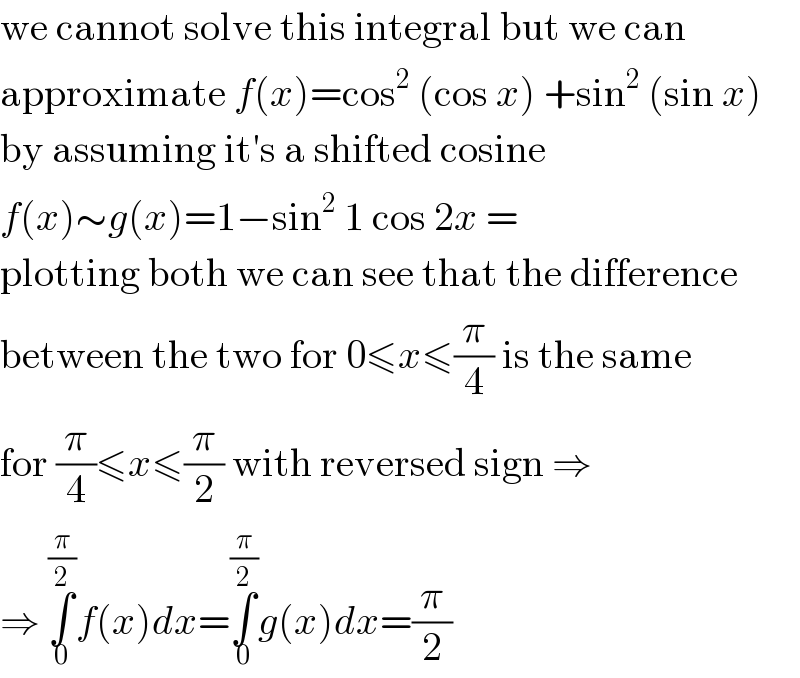Question Number 78334 by john santu last updated on 16/Jan/20
![∫_0 ^(π/2) [cos^2 (cos x)+sin^2 (sin x) ] dx](https://www.tinkutara.com/question/Q78334.png)
$$\underset{\mathrm{0}} {\overset{\frac{\pi}{\mathrm{2}}} {\int}}\:\left[\mathrm{cos}\:^{\mathrm{2}} \left(\mathrm{cos}\:{x}\right)+\mathrm{sin}^{\mathrm{2}} \:\left(\mathrm{sin}\:{x}\right)\:\right]\:{dx} \\ $$
Commented by MJS last updated on 16/Jan/20

$$\mathrm{we}\:\mathrm{cannot}\:\mathrm{solve}\:\mathrm{this}\:\mathrm{integral}\:\mathrm{but}\:\mathrm{we}\:\mathrm{can} \\ $$$$\mathrm{approximate}\:{f}\left({x}\right)=\mathrm{cos}^{\mathrm{2}} \:\left(\mathrm{cos}\:{x}\right)\:+\mathrm{sin}^{\mathrm{2}} \:\left(\mathrm{sin}\:{x}\right) \\ $$$$\mathrm{by}\:\mathrm{assuming}\:\mathrm{it}'\mathrm{s}\:\mathrm{a}\:\mathrm{shifted}\:\mathrm{cosine} \\ $$$${f}\left({x}\right)\sim{g}\left({x}\right)=\mathrm{1}−\mathrm{sin}^{\mathrm{2}} \:\mathrm{1}\:\mathrm{cos}\:\mathrm{2}{x}\:= \\ $$$$\mathrm{plotting}\:\mathrm{both}\:\mathrm{we}\:\mathrm{can}\:\mathrm{see}\:\mathrm{that}\:\mathrm{the}\:\mathrm{difference} \\ $$$$\mathrm{between}\:\mathrm{the}\:\mathrm{two}\:\mathrm{for}\:\mathrm{0}\leqslant{x}\leqslant\frac{\pi}{\mathrm{4}}\:\mathrm{is}\:\mathrm{the}\:\mathrm{same} \\ $$$$\mathrm{for}\:\frac{\pi}{\mathrm{4}}\leqslant{x}\leqslant\frac{\pi}{\mathrm{2}}\:\mathrm{with}\:\mathrm{reversed}\:\mathrm{sign}\:\Rightarrow \\ $$$$\Rightarrow\:\underset{\mathrm{0}} {\overset{\frac{\pi}{\mathrm{2}}} {\int}}{f}\left({x}\right){dx}=\underset{\mathrm{0}} {\overset{\frac{\pi}{\mathrm{2}}} {\int}}{g}\left({x}\right){dx}=\frac{\pi}{\mathrm{2}} \\ $$
